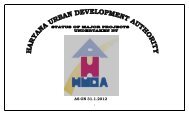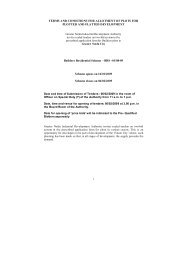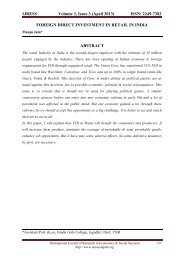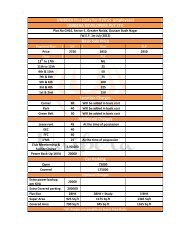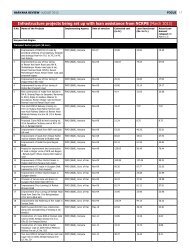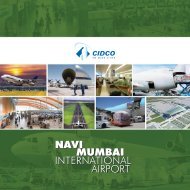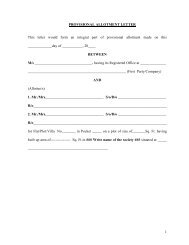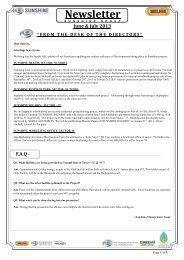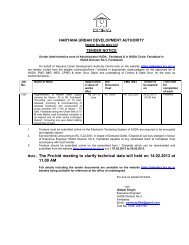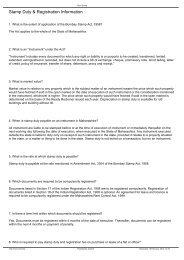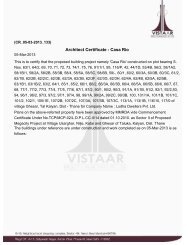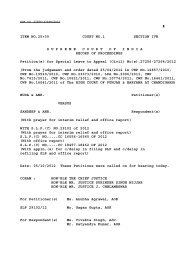eLegalix - Allahabad High Court Judgment Information System ...
eLegalix - Allahabad High Court Judgment Information System ...
eLegalix - Allahabad High Court Judgment Information System ...
Create successful ePaper yourself
Turn your PDF publications into a flip-book with our unique Google optimized e-Paper software.
JUDGMENT/ORDER IN - WRIT - C No. 37443 of 2011 at <strong>Allahabad</strong> Dated-21.10.20... Page 73 of 197http://elegalix.allahabadhighcourt.in/elegalix/WebShow<strong>Judgment</strong>.do10/21/2011cannot come in the way of the petitioners for getting the notifications quashed and restoration of land and thesethird party rights having been created in spite of entertaining various writ petitions by this <strong>Court</strong>, the respondentscannot be allowed to claim any benefit. The development as alleged by the interveners of some of the areas ofland is on their own risk and cost and cannot be taken as shield to protect the illegal arbitrary actions of therespondents.(19)After order dated 26.7.2011 in writ petition No. 37443 of 2011, the authority themselves called the landowners of village Patwari and a settlement was entered between them by which additional compensation of Rs.550/- per square meter was paid by the Authority. The Authority however, has not called the land owners of othervillages for any such settlement which is discriminatory and arbitrary.(20)The authority having not obtained approval of Greater Noida Master Plan 2021 from National Capital RegionalPlanning Board constituted under National Capital Regional Planning Board Act, 1995, cannot proceed with anydevelopment or to allot the land to builders/colonizers as per Plan 2021.Arguments on behalf of the State were lead by Sri L. Nageswar Rao, Senior Advocate and Sri Ravi Kant, SeniorAdvocate.Learned Counsel appearing for the State respondent refuting the submissions of learned counsel for thepetitioners contended that most of the writ petitions filed by the petitioners is barred by delay and laches anddeserve to be dismissed on this ground alone. It is submitted that most of the petitioners were prompted by thejudgment of the apex <strong>Court</strong> in the cases of Radhey Shyam and Devendra Kumar (supra) and as a matter of factthe petitioners in the aforesaid two cases were vigilant and approached the <strong>Court</strong> within time, cannot give a causeof action to others to rush to this <strong>Court</strong> at this belated stage. The petitioners ought to have challenged the landacquisition proceedings immediately after declaration under section 6 was issued. The petitioners having notapproached the <strong>Court</strong> immediately after issuance of declaration under section 6, the writ petitions are barred bylaches. Possession was taken by the State in accordance with law and in consequence of taking possessionunder section 17(1) of the Land Acquisition Act, the land has vested in the State free from all encumbranceswhich cannot be divested. The writ petition challenging the acquisition at this stage when the land has alreadyvested in the State cannot be entertained. Taking of possession by the State was by executing a Panchnamawhich is recognized mode of taking possession where large tract of land is acquired. Taking of actual physicalpossession is not possible in the circumstances when large tract of land is involved and taking of symbolicpossession is sufficient compliance of section 17(1) of the Land Acquisition Act. The majority of the land ownershave accepted compensation voluntarily under 1997 Rules. After accepting compensation under 1997 Rules, it isnot open for them to challenge the acquisition. The land owners have waived their right after acceptingcompensation under 1997 Rules. . In the event the land owners were not satisfied with the payment ofcompensation under Agreement it was open for them to approach the Collector under Rule 6 of 1997 Rules forsetting aside of the agreement which having not been done in any case it is not open for the petitioners tocontend otherwise. The petitioners having acquiesced to the acquisition proceedings they are stopped fromchallenging the notifications under section 4 and 6. In most of the cases, award has already been declared andthose who have not accepted compensation under 1997 Rules can very well take recourse of Section 18. TheDivision Bench judgment in the case of Harkaran Singh Vs. State of U.P. which is latter judgment to the DivisionBench judgment in the case of Harish Chand Vs. State of U.P. is per in curium. In Harkaran Singh's case, theDivision Bench after perusing the records of the State Government returned the finding that invocation of Sections17(1) and 17(4) was in accordance with law. The subsequent Division Bench in Harkaran Singh's case could nothave taken the contrary view and only course open for the subsequent Division Bench was to make a referencefor consideration by larger Bench which having not been done, the judgment of Harkaran Singh's case has to beignored. Several notifications which are under challenge in these writ petitions have already been upheld bydifferent Division Benches of this <strong>Court</strong>, in view of which decisions, the impugned notifications have also to beupheld. In some cases against the Division Bench judgment upholding the notifications under sections 4 and 6,Special Leave Petition have already been dismissed by the apex court. Following the judgment of Harish Chand'scase, all the writ petitions deserve to be dismissed. After taking possession of land by the Authority, the same wasdealt with by the authority in accordance with Master Plan 2021 by allocating it for different uses namely;industrial, commercial, residential, green area etc. Third party rights have been created by making variousallotment and allottees are in possession and have carried on various development work. The prayer of thepetitioners to quash the acquisition at this stage cannot be allowed. There was no colourable exercise of power bythe State. There was sufficient material before the State Government for invocation of Section 17(1) and 17(4).Subjective satisfaction of the State Government in invoking urgency clause can be challenged only on limitedgrounds of malafide and there being no pleadings or grounds alleging malafide against the State, subjectivesatisfaction cannot be interfered with by this <strong>Court</strong>. Non compliance of Section 17(3A) is not fatal to theacquisition proceedings as has already been held by the apex <strong>Court</strong> in various judgment. Section 11 A is not



